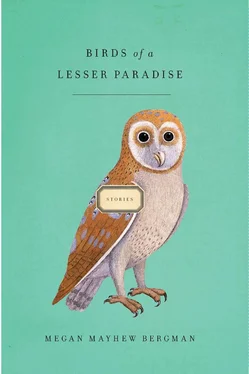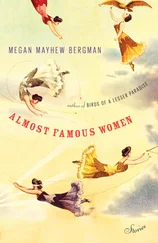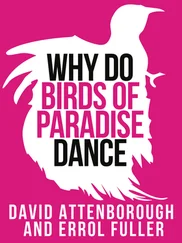You do not understand, I said, gripping the countertop and closing my eyes.
Malachi began backing away to the French doors that opened onto the slate patio, where he was grilling eggplant steaks. He was a vegetarian epicure who snuck bites of bacon out of salads and quiches when he thought I wasn’t looking. His senior year at Yale, he’d started a nonprofit he called Enough with Us, or EWU — an earnest throwback to Wordsworth’s poem “The World Is Too Much with Us.” In the eight years since, he’d put out two books and worn a path along the liberal college and Unitarian lecture circuit, advocating the end of humankind, sacrificing the human race to let nature reclaim the earth.
I was proud of him. I thought he was right. I’d grown up under two biology enthusiasts in rural Maine, where people were scarce and wilderness still had an edge. I wanted nature to win, too.
Malachi dreamt of thick forests and megafauna consuming urban landscapes, nothing but our plastics and waste scarring the earth centuries after our disappearance. He pinned lush pictures of Borneo to our bedroom walls, cliffs with rivulets of water spilling down, visions of earth with no evidence of man’s hand.
Five years ago, I met Malachi at a vegan cooking class on P Street. We made a savory vegetable pot pie and went out for wine afterward. We moved in together within a year. He knew a lot about food, poetry, music, and politics, and I introduced him to the outdoors — camping, hiking, foraging. On weekends we cooked for friends, volunteered at events for the local animal shelter, saw live music, and took long walks in Rock Creek Park.
In our house, the word breeding was said with the same vitriol used when mentioning Republicans, Tim Tebow, and pit bull fight clubs. Women churning out multiples were breeders, and when they were profiled as heroes in newspapers and television shows, Malachi wrote editorials that usually went unpublished. We are parasites on the world, all of us, he’d written. His thoughts — our thoughts? — were not palatable to most people, including my family. I’d learned voluntary extermination was not fodder for pleasant table conversation; two years ago Malachi blasted my mother over pumpkin pie for expressing her hopes for grandchildren.
You’d give them a death sentence, he said. Massive water shortages and die-offs are imminent. It’s selfish to make more of ourselves; the desire to see your genes replicated in the world is a crude biological impulse.
Before you got one one-hundredth of the world to take you seriously, she said, and that wouldn’t be enough, the earth would already be shot, done for. There may be time to turn things around.
There isn’t, Malachi said.
You are one hundred thirty pounds of FUN, Mom said, mocking Malachi’s slight frame. He scowled.
You think I like the fact—
Look, Mom said. When it comes to mass annihilation, put your money on a rogue black hole or nuclear winter. You’re pinning your hopes on the very people you’d like to extinguish.
My mother, the longtime director of one of Maine’s conservation organizations, was no softhearted bridge player who pined for craft time and sing-alongs. She wore no makeup and kept her gray hair cropped short in a pixie cut. At fifty she’d hiked the Long Trail on her own, kayaked whale-watching expedition routes off the coast of Lunenburg in Nova Scotia. Compared to Malachi, she was no less ardent an environmentalist, just hopeful.
Malachi paced in front of the patio doors, one hand in his hair, then on his lips. Hand me a plate, he said.
Where are you going? I said, something feminine and hysterical brewing inside me.
I’m not walking away from you, he said. I’m walking toward the eggplant. I need to be outside to think.
When he opened the door, the city screamed and the postwork din of Washington’s Dupont Circle spilled into our town house. Busy people walking, talking, eating, spending. The door shut behind him, and it was as if I were standing in a soundproof room. Or drowning.
Maybe I’d missed a birth control pill. Maybe my body had imposed its will and bypassed my medication and social convictions. Maybe the universe was making an example out of me: You are an animal. You are a mammal. This is what your body wants.
I guess all the cerebral striving in the world couldn’t combat the biological basics.
I’d begun suspecting pregnancy earlier in the week. My breasts were sore and Tuesday morning I’d nearly blacked out in the shower; the scent of my mango shampoo turned my stomach. I had no interest in morning eggs. I worked as a veterinary technician at the zoo and was asked to assist with the necropsy of an oryx; I begged off as soon as the veterinarian began to split the animal’s flesh with his scalpel. I was exhausted and wanted nothing more than to read a book on the couch the last few evenings, a time when Malachi and I often went out to coffee shops and bars to recruit new EWU members.
What if? What if? All the sermonizing I’d done to friends, on the phone to my sister. If we all begin to make these sacrifices . it’s about better decisions. .
As I unwrapped the pregnancy test, I’d thought: Just because you signed the No Breeding Pledge doesn’t mean you can’t create a life within your own body.
And so I had.
Malachi came back into the kitchen with the plate of eggplant steaks. They were drizzled with olive oil and topped with crumbled fresh feta cheese, roasted garlic, and rosemary, which we grew in a planter outside.
I can’t eat, I said, waving him off and moving to the couch, a secondhand green corduroy sectional. Our living room and kitchen were essentially the same room, set apart by a large, potted jade plant Malachi had maintained since college. One wall was exposed brick. Custom shelving lined the fireplace and held carefully selected books — Edward Abbey, Thoreau, Emerson, Rachel Carson, Sibley Guides. There were books on debt forgiveness, foreign travel, languages, seal hunting — all ready for the sporting scrutiny of our dearest friends, who came over on weekends wearing chic vintage and bearing artful hors d’oeuvres.
Are you going to call your mother? he said. Because I think you should wait. She’ll—
I’m going to distract myself, I said. Sit with the information a little longer.
I needed to be still, slow down, press pause, because I’d never entertained the idea of becoming a mother. Well, I hadn’t entertained the idea since college, when nearly all my friends assumed we would one day have children. But it wasn’t real then. Children were only a far-off given, a thing that happened to you, like wisdom teeth. It wasn’t until I met Malachi that I began to feel the weight of human guilt.
Malachi set the plate down and made me ginger tea with a splash of agave nectar. He delivered it to the coffee table next to me without asking, as if to underscore his utility and devotion as a partner. Then he fixed himself a plate and sat properly at the table, cutting the entire eggplant steak into cubes before taking a bite. I propped myself on a pillow and began reading a book on the intelligence of pigs. Except I wasn’t reading.
The book reminded me of the slick and waxen fetal pig I’d refused to dissect in high school biology, how I couldn’t bring myself to cut its perfect skin. There’d been what looked like a smile on its nascent face, as if it still expected to be born, and was hopeful for what life would bring — green pastures, slop, other warm bodies. The teacher subtracted points from my participation grade and granted me access to a virtual dissection, where I dragged a pixilated heart across the screen of a second-rate Toshiba.
Just before lab, a kid in my class, a farmer’s son, had said: Pigs sing to their children.
Читать дальше












